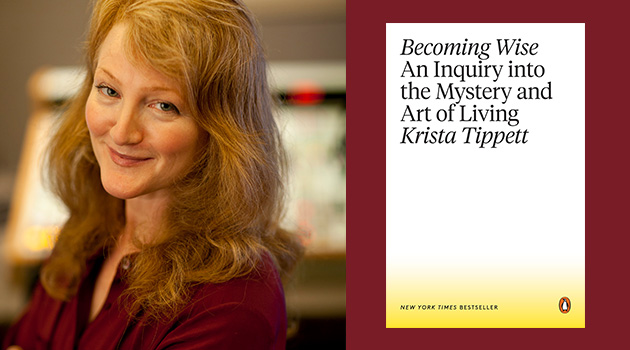Becoming Wise With Krista Tippett

Kait Smith: Do you have a ritual that you do before each of your radio shows?
Krista Tippett: I do a lot of preparation, trying to understand how someone thinks – not just what they know – so they will feel at ease from the first. I call it my “Vulcan mind meld” approach to interview preparation, and it’s an important part of creating a hospitable space in which people can truly think out loud. And of course, the better prepared I am, the more comfortably I can put my notes to one side and also enter the adventure myself completely. Other than that, I make myself a cup of tea. If the interview is in person I obviously have to sit up straight and make eye contact. But if I’m alone in my studio as is often the case, and they are coming in through my ears and into my mind directly by way of wondrously intimate technology, I will take off my shoes, sit in the lotus position and close my eyes, meeting them voice to voice.
KS: You’ve been hosting your show for the last 13 years, who has been the most surprising guest that you’ve had?
KT: Surprise is my measure of a good conversation – the possibility that my conversation partner will surprise themselves by putting words around something they haven’t quite put words around before. In the last year, my interview with Martin Sheen comes to mind – someone who many of us feel we know as an actor and a public personality. But he was so ready to open up and share a side of himself that was news to me and many – the adventurous life he’s had a social justice activist and the deep spiritual commitment and theology that underpin that.
KS: Is there a lesson that you’ve learned from a guest that you’ve incorporated into your spiritual life?
KT: My Buddhist conversation partners eventually persuaded me that I don’t have to consider myself a meditation/mindfulness failure if I can’t sit for an hour a day. This year, Mirabai Bush helped me begin to join my very modest commitment to daily meditation (5-10 minutes each morning) with prayer, which is the spiritual technology of my religious mother tongue.
KS: Your newest book Becoming Wise has been called a “Master Class in living that offers a grounded and fiercely hopeful vision of humanity” a topic that is extremely relevant today. What was your inspiration for this book?
KT: The original inspiration was the question that’s always come at me across the years, about recurring themes and qualities in lives of grace, beauty, and spiritual genius. As I pursued that – literally pouring through and reflecting on more than a decade of conversation – I realized that wisdom is the keyword, and that it is something that emerges through the raw materials of any life and is accessible to us all. That eventually felt like the most important thing I had to share. So did the fact that wisdom can and must be an aspiration for our life together, not just as an individual virtue.
KS: On your book tour, what is the one item you always have with you?
KT: Yoga clothes.
KS: If you could invite any five people to your dinner party dead or alive who would you invite?
KT: Oh this is a hard one, and I’d give you a different list any week you asked. Let’s stick with dead: Albert Einstein. Dorothy Day. Martin Luther King Jr. Rainer Maria Rilke. Wangari Maathai.
